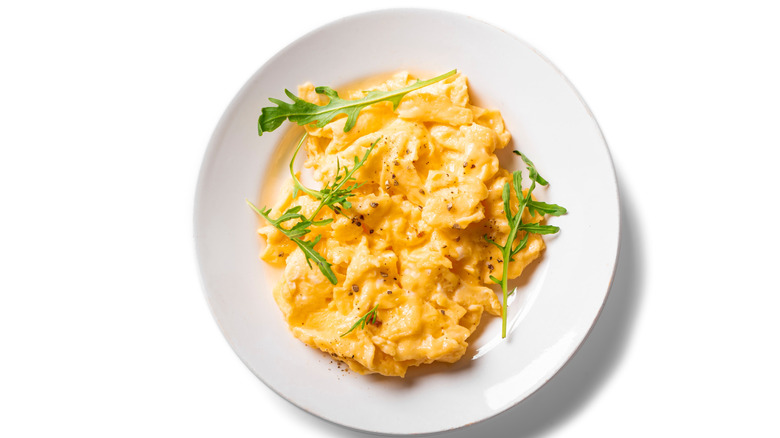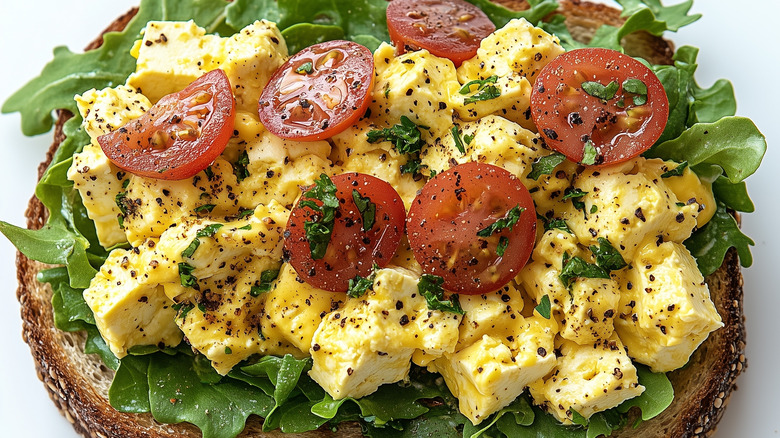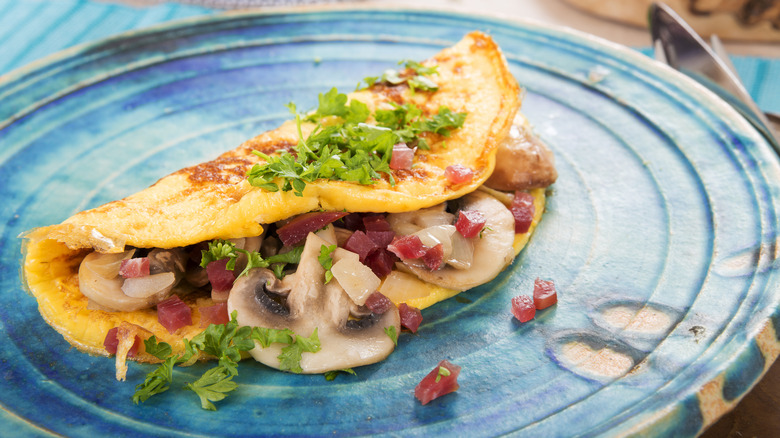What To Expect With The Future Of Vegan Egg Alternatives
We may receive a commission on purchases made from links.
With mounting concerns about the effects of animal-based products on climate change and animal welfare, paired with projected consumer demand for egg substitutes, companies around the globe are expanding their research and experimentation to develop high-quality plant-based alternatives. There are excellent egg substitutes for every occasion like aquafaba, some fruits, flax seeds, and more — that are best in specific applications, particularly baking.
Meanwhile, several companies like Just Egg, Bob's Red Mill, Evo Foods, and Simply Eggless have crafted replacements that range from liquid to powder and even hard-boiled. However, none of these quite captures the entire essence of the protein in all of the ways a standard egg, from scrambling and baking to binding and emulsifying. But armed with a vast amount of research, and utilizing cutting-edge technology, food scientists are getting closer to creating a solution.
Researchers have focused on studying plants that are both affordable and sustainable, which also contain proteins that are most likely to imitate the reaction of eggs when heated. Some of the most popular products on the market are made from mung beans (like you'll find in the Just Eggs brand) or lupin beans, but there are other options too.
However, creating a substitute that has both the flavor and texture of a traditional egg is where the challenge lies. Thankfully, there are a few ways those obstacles are being tackled.
Flavor improvements for vegan egg alternatives
While the flavor in egg substitutes varies, some versions can come close to the original while others may sport undertones that range from vegetal to bean-like. This may be most evident when you're trying to whip up an omelet, scramble, or quiche, but it can also alter the flavor of any cakes, muffins, or cookies you might be baking. To combat this, scientists are working to isolate the enzymes that can cause flavors that may not channel that typical taste of traditional egginess. While the process is challenging, some brands have made strides and are getting closer to the target of replicating the savory flavor profile of an egg.
If you're looking to improve the flavor of your chosen egg substitute, there's one simple ingredient that you can use: black salt, also known as kala namak. Hailing from South Asia, you may already find it on the ingredient list of a few popular varieties of egg replacers, but if it's not in yours it may be a game-changer. Thanks to the sulfur in it, this salt can help to impart a classic eggy flavor to your less-than-convincing substitute.
How scientists are replicating the texture of eggs
Recreating the texture of traditional eggs is just as important, especially when the substitute is being used on its own. For this, food scientists are honing in on the specific plants that are most likely to replicate the consistency of an egg when it's heated. One of the ways they do that is to compare the setting temperatures of the plant proteins to eggs. Specific legumes, canola, and rubisco are among those with proteins with the closest setting temperatures, making them potentially ideal for use in a replacer that will firm up similarly to an egg. Meanwhile, some are even using artificial intelligence to help zero in on other plant proteins that will recreate the ideal consistency.
However, the plant itself isn't the only issue when crafting the ideal texture of vegan egg alternatives. To create the perfect balance, researchers are also varying the amount of oil and various gums, which can also help with emulsification, to improve the overall texture when heated.
Want to improve the texture of your egg substitute at home? It's easy. For creaminess, try adding silken tofu or plain yogurt. Or, to boost the fluffiness of your cakes and muffins, adding a bit of baking soda and vinegar may help.
Other ways food scientists intend to enhance vegan egg alternatives
Flavor and texture aren't the only things food scientists and manufacturers are looking to improve. From the potential introduction of nutrients like calcium and increased iron to added lutein, plant-based substitutes could turn out to be packed with more valuable nutrition than eggs already are. Plus, vegan versions of eggs are already often lower in cholesterol and calories.
In addition, companies involved in the production of vegan egg alternatives are not only creating alternative products for home cooks to fold into batters for baked goods, make egg-less ice cream, or fry up on the stovetop. They're also innovating in terms of prepared foods. As these companies continue to grow, egg alternative enthusiasts should expect to continue to find new products that range from breakfast sandwiches, egg-style patties, premade baked goods, egg white alternatives, and omelets, making it easier than ever to replace eggs in anyone's diet.




